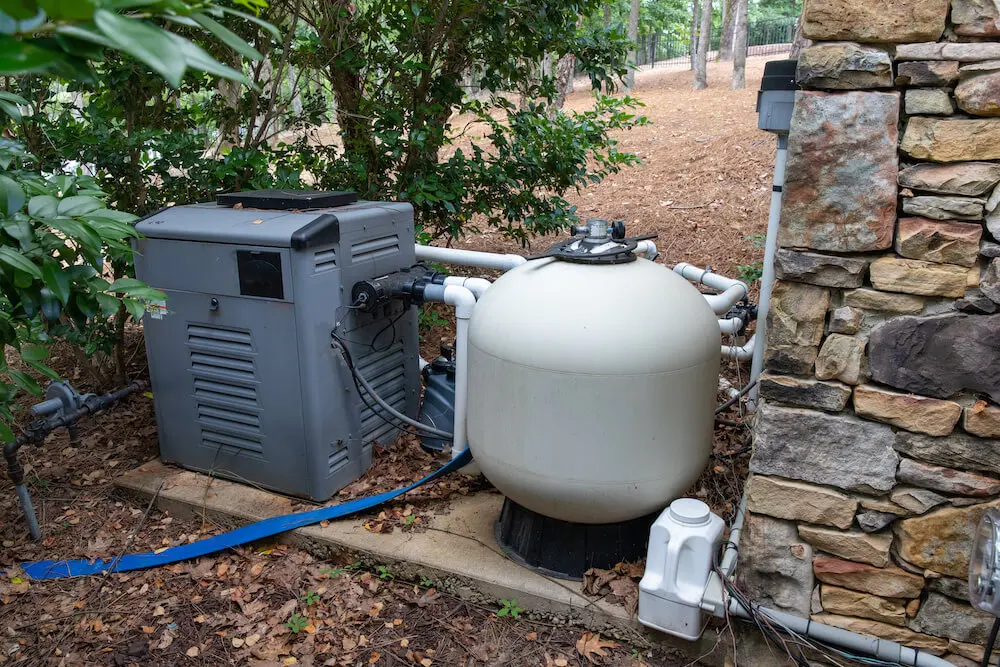You might check your weather app and see that rain clouds are heading in your direction on any given day. While a little drizzle isn’t typically something to be concerned about, many homeowners spring into action to ensure that anything that could be affected by the rain has been tended to before the downpour starts.
For those who own pools, precipitation raises a pertinent question: what are the best pool maintenance practices during rainy weather?
Prioritize Safety
There are some key measures you can and should take when the rain kicks in. But there’s no need to be a hero — even if you don’t see any lightning or dangerous weather patterns, that doesn’t mean you should spend time outside around metal components.
The last thing you want to be doing is holding a telescopic skimmer pole or your pool’s exit ladder when you hear a thunderclap. Much of what you can do for your pool can wait until after the storm passes, so if you’re even slightly concerned, know that you can put off most pool maintenance tasks with no adverse consequences.
The Rain, Your Pool Pump, and You
Don’t worry about changing your pool pump settings if it’s already raining. In fact, doing so is discouraged, as it would involve you handling delicate electrical equipment. If you know rain is coming at some point during the day, you can take preventive measures by adjusting your pump before the storm.
You also don’t need to worry about your circulation system during rainstorms. Rainy weather is the perfect time for your self-cleaning system to do its thing. You still want the chemicals to eat away at any dirt and debris like any other time, especially if you couldn’t cover your pool before the rain arrived.
The caveat is that if your pump runs during a lightning storm, it could be damaged if lightning happens to strike it. Still, it’s better for it to strike the pump than you.
If the forecast calls for thunderstorms, go ahead and switch off any electrical devices connected to your pool. Just remember to switch it back on after the storm to ensure that it continues to help clean out any impurities.
That said, it’s still recommended that you cover your pool, even if you leave your circulation system running. While the cleaning system can filter out any contaminants the rain may bring, sizable debris like leaves and tree branches can catch the wind and end up in your pool, leaving you to deal with the messy aftermath.
After the Storm
Depending on the storm’s intensity, you might find yourself with a more extensive cleanup than you bargained for. Start by skimming and brushing your pool to remove any larger debris, then use an automatic vacuum to remove the smaller bits and finish the job.
You’ll also want to test your pool to make sure it still has the right chemical ratio. Rain will inevitably change your water’s pH balance, and an incorrect pH can make chlorine less effective at fighting off algae and bacteria.
If your filter caught a lot of debris from the wild winds whipping through, it’s also wise to perform a complete filter cleaning to keep up with your pool maintenance.
There’s a chance that particularly heavy or long-lasting rain could cause your pool to overflow.
It’s best to wait out the storm before you deal with this problem. But if you’re concerned, you can invest in a DE filter to help preemptively keep water levels low. These devices are recommended for homeowners who are worried that higher water levels could reach their homes and cause water damage.
The other option is to use a submersible pump. You’ll generally want to wait for a storm to pass before setting these up, but you can deploy submersible pumps during a storm if necessary. These pumps are uniquely designed for use in and around water.
You can use a submersible pump after the rain to help drain the excess water from your pool. Different pumps can handle different loads, so it’s possible that your pump may not be able to keep up with the rate at which the rain falls. Even so, investing in one could give you peace of mind if you’re worried about your pool overflowing.
Keep Calm and Carry On with Professional Pool Maintenance
Cleaning your pool after a severe storm can take a lot of time and effort. Fortunately contacting your local professional pool cleaning company can make the process much easier. Don’t hesitate to seek assistance getting your pool up and running again after heavy rainfall.





